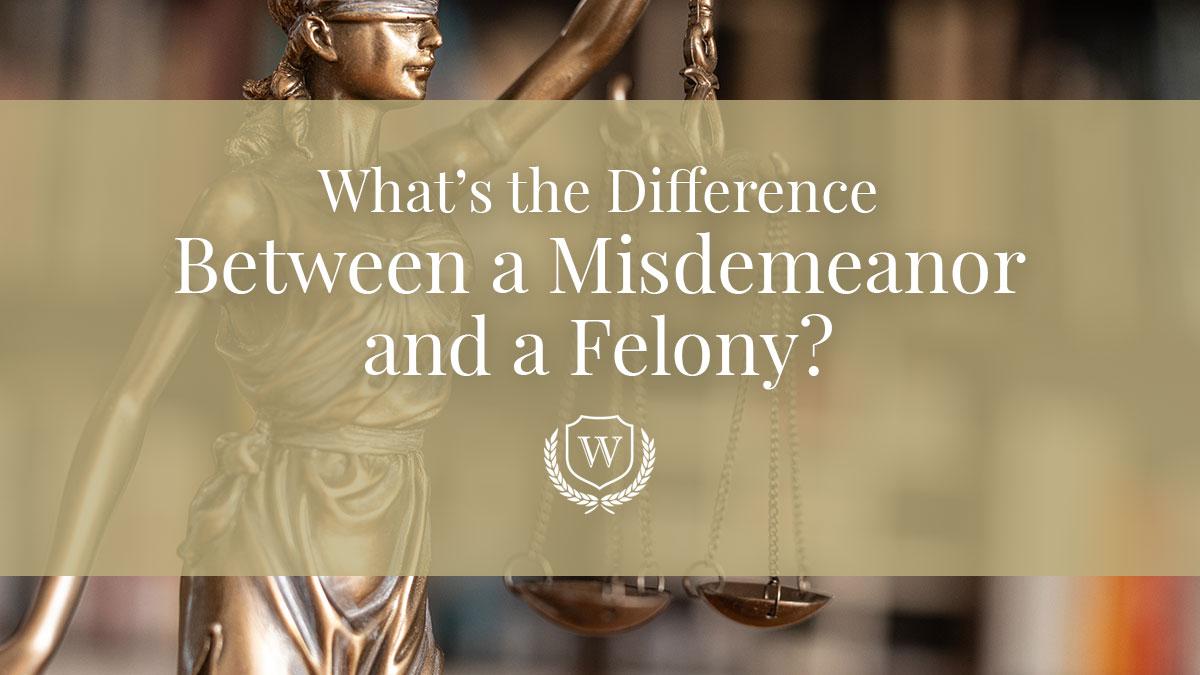
What’s the Difference Between a Misdemeanor and a Felony?
Like most states, Florida divides levels of criminal charges between two central categories - misdemeanors and felonies. Both can carry significant penalties. There are some distinctive differences between them that should be understood if you have been charged with a crime.
Generally speaking, misdemeanors are not as severe as felonies. A misdemeanor may have little impact on someone's life, while a felony will have a long-term impact.
What is a Misdemeanor?
Misdemeanors are typically less egregious offenses with minimal economic or physical damage being done. It is more severe than a civil infraction, which is a violation such as a speeding ticket. Shoplifting or a bar fight, for example, would be classified as misdemeanors. In Florida, misdemeanors typically include petit theft, DUIs, simple batteries, and possession of drug paraphernalia or possession of marijuana less than 20 grams. While the maximum sentence for a misdemeanor in Florida is up to a year in the county jail and/or a $1,000 fine, these cases are typically resolved via probation and lesser fine. It is good to know that a misdemeanor typically has no effect on most civil liberties but some may affect your driver’s license. This means a person can still own a gun, vote and hold public office if they have been convicted of a misdemeanor.
Within Misdemeanors, there are two classes - first and second degree misdemeanors. Second degree misdemeanors are the lowest level of criminal offenses and carry lower penalty maximums, they should still be taken just as seriously as any other offense. First degree misdemeanors are you more serious of these offenses that can expose the defendant to the statutory maximums.
What is a Felony?
A felony is the most serious type of crime. This category includes violent crimes such as murder, rape, robbery, kidnapping, arson, weapons charges, and drug offenses. Felonies carry much more significant penalties compared to misdemeanors. While Felonies technically pick up where misdemeanors leave off in terms of sentence length and find, very few cases resolve for a year and a day in prison or $1001 fine. More often, a person charged with a felony can expect to face thousands of dollars in fines and fees and years of probation or prison, with the most severe charges carrying up to life in prison or even the death penalty in the most severe cases in the State of Florida.
In Florida, Felonies are classified in terms of degrees - a brief lay out of the various types are listed below:
Capital and life felonies are the most serious crimes in Florida. Capital felonies are punishable by the death penalty or life in prison without the possibility of parole. First degree murder is an example of a capital felony. Life felonies are punishable by life imprisonment and a fine of up to $15,000. (Fla. Stat. §§ 775.082, 775.083 (2019).)
Felonies of the first degree in Florida are usually punishable by up to 30 years in prison and a fine of up to $10,000. (Fla. Stat. §§ 775.082, 775.083 (2019).)
Felonies of the second degree can result in a prison term of up to 15 years and a fine of not more than $10,000. (Fla. Stat. §§ 775.082, 775.083 (2019).)
Felonies of the third degree are the least serious types of felonies in Florida, punishable by up to five years in prison and a fine of up to $5,000. (Fla. Stat. §§ 775.081, 775.082, 775.083 (2019).)
A felony conviction can impact a person's life for many years. They may lose their right to bear arms and vote. Many employers choose to not hire felons, which can severely impact job opportunities. Some felony charges may force a person to register as a sex offender, which will affect where they are able to live.
One of the most difficult experiences a person can face is being charged with a crime. If you or a loved one find yourself in this situation, you need a team of capable and qualified Criminal Defense attorneys that can help you navigate these uncertain times and fight for the rights and freedom of the accused. At the Wynn Law Firm, you will see the difference that passion and dedication can make for you or your loved ones when they’re charged with a crime. Our team of professional and experienced lawyers stand ready to represent you in Panama City, Marianna and the surrounding communities, whatever your need may be. To discuss your case, call 850-526-3520 today.